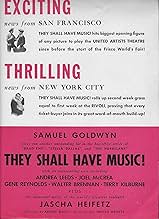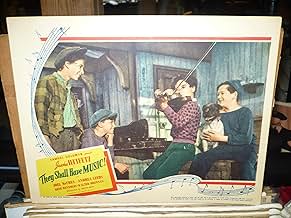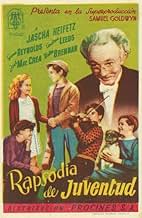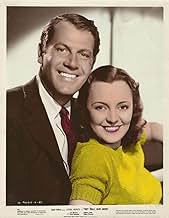IMDb RATING
6.9/10
533
YOUR RATING
A boy runs away from home and ends up at a music school for poor children. When the school suffers hard times, he enlists the aid of violinist Heifetz to save the day.A boy runs away from home and ends up at a music school for poor children. When the school suffers hard times, he enlists the aid of violinist Heifetz to save the day.A boy runs away from home and ends up at a music school for poor children. When the school suffers hard times, he enlists the aid of violinist Heifetz to save the day.
- Nominated for 1 Oscar
- 3 wins & 1 nomination total
Gale Sherwood
- Betty
- (as Jacqueline Nash)
Alexander Schoenberg
- Menken
- (as Alexander Schonberg)
- Director
- Writers
- All cast & crew
- Production, box office & more at IMDbPro
Featured reviews
I think Samuel Goldwyn was trying to accomplish two things in this film. First the film is a homage to Jascha Heifetz, considered to be the best violin virtuoso of the past century. Secondly having brought to the screen the Dead End kids with his film of the same title and seeing them sign with Warner Brothers, he was trying to create a second gang of appealing urchins.
Though the film was good there certainly was no demand that the kids from this film be reteamed for another feature.
Leader of the gang is Gene Reynolds who at one time played the violin, but now leads a street gang of disreputable urchins. His stepfather, Arthur Hohl, breaks the violin his late father gave young Reynolds and threatens to send him to reform school over the feeble protests of his mother Marjorie Main.
Young Reynolds happens to stumble onto a music school run by the old music maestro himself, Walter Brennan and his daughter Andrea Leeds. They take him in, but they have their financial problems with a lot of creditors led by Porter Hall.
This film is mostly to be seen today because it's a chance for classical music lovers to see and hear Jascha Heifetz who as you gather is the solution one way or another to everybody's problems. Joel McCrea is in this film also, but has a rather colorless part as Andrea Leeds boyfriend.
Besides Heifetz, one thing the film does do is touch on, albeit gingerly on the topic of child abuse and battered spouses. Arthur Hohl is one mean man and Marjorie Main is very clearly a much battered wife.
The kids in the cast do well, Reynolds, Tommy Kelly, Terry Kilburn and a young girl under the name of Jacqueline Nash who grew up and performed as Gale Sherwood, nightclub partner to Nelson Eddy. She had a nice soprano even as a child.
But it's Heifetz you see the show for.
Though the film was good there certainly was no demand that the kids from this film be reteamed for another feature.
Leader of the gang is Gene Reynolds who at one time played the violin, but now leads a street gang of disreputable urchins. His stepfather, Arthur Hohl, breaks the violin his late father gave young Reynolds and threatens to send him to reform school over the feeble protests of his mother Marjorie Main.
Young Reynolds happens to stumble onto a music school run by the old music maestro himself, Walter Brennan and his daughter Andrea Leeds. They take him in, but they have their financial problems with a lot of creditors led by Porter Hall.
This film is mostly to be seen today because it's a chance for classical music lovers to see and hear Jascha Heifetz who as you gather is the solution one way or another to everybody's problems. Joel McCrea is in this film also, but has a rather colorless part as Andrea Leeds boyfriend.
Besides Heifetz, one thing the film does do is touch on, albeit gingerly on the topic of child abuse and battered spouses. Arthur Hohl is one mean man and Marjorie Main is very clearly a much battered wife.
The kids in the cast do well, Reynolds, Tommy Kelly, Terry Kilburn and a young girl under the name of Jacqueline Nash who grew up and performed as Gale Sherwood, nightclub partner to Nelson Eddy. She had a nice soprano even as a child.
But it's Heifetz you see the show for.
I caught a clip of this film with Heifetz's performance of Tchaikovsky's Violin Concerto on YouTube - which was phenomenal. Watching the performance from the wings with Andrea Leeds was an actor who looks exactly like Frank McHugh (with mustache), but there's no mention of him in the cast, or of this appearance on his biography page. I assume he was an extra even though he was rather prominent in this single(?), non-speaking appearance in the film. Can anyone confirm if it was him, one way or the other?
Does anyone know if this movie is available on VHS or DVD? I remember seeing it, I believe, on TV, but I'm not certain as to whether I watched a clip of it in a documentary biography of Heifetz, or saw the film, itself.
Does anyone know if this movie is available on VHS or DVD? I remember seeing it, I believe, on TV, but I'm not certain as to whether I watched a clip of it in a documentary biography of Heifetz, or saw the film, itself.
You may have heard that music is the universal language. Nowhere is that more true than in Archie Mayo's "They Shall Have Music". It focuses on a troubled boy who runs away from home and joins a struggling music school. Things take a turn when Jascha Heifetz (playing himself) enters the scene.
The movie addresses poverty and funding for the arts. And in the process, we get to hear some masterful performances of works by the great composers (and of course, during the Barber of Seville overture, I pictured Bugs Bunny subjecting Elmer Fudd to all sorts of humiliation to the tune of the overture). No surprise that the children perform the music exquisitely, since Samuel Goldwyn hired the Meremblum Orchestra to star in the movie.
It might not be the greatest movie ever made, but I hope that it reminds people of the importance of the arts. Indeed, during WWII, Winston Churchill got asked if he planned to cut funding for the arts to redirect the money to the armed forces, and he said "Then what are we fighting for?" Alfred Newman's Academy Award-nominated score is like a character by itself. I definitely recommend this movie.
The movie addresses poverty and funding for the arts. And in the process, we get to hear some masterful performances of works by the great composers (and of course, during the Barber of Seville overture, I pictured Bugs Bunny subjecting Elmer Fudd to all sorts of humiliation to the tune of the overture). No surprise that the children perform the music exquisitely, since Samuel Goldwyn hired the Meremblum Orchestra to star in the movie.
It might not be the greatest movie ever made, but I hope that it reminds people of the importance of the arts. Indeed, during WWII, Winston Churchill got asked if he planned to cut funding for the arts to redirect the money to the armed forces, and he said "Then what are we fighting for?" Alfred Newman's Academy Award-nominated score is like a character by itself. I definitely recommend this movie.
I really enjoyed this movie, and I'm not a classical music fan. The story of the tough street kid discovering classical music and changing his ways was great to watch, without being sentimental or too unbelievable, although some details had me scratching my head (Frankie and his dog can live in the basement of the school without any of the students or teachers discovering him? Where did he eat? Bathe? Did he ever get a change of clothes? What did he feed his dog? The owner of the school didn't think it was important to notify the police about finding a missing boy, but let him live in the basement indefinitely? :-) ). But we can let such unrealistic details slide and just enjoy the touching, fun, and slightly suspenseful (for me, anyway) story and wonderfully talented children.
I loved the scene with the mothers standing shoulder to shoulder on the steps barring the policemen from entering the school: I doubt they would get away with that nowadays. And I liked the nice touch about the boy Frankie stole from turning the tables on him (although that never really went anywhere), and Frankie's friends helping him out in the end.
All in all, a great movie for everyone!
I loved the scene with the mothers standing shoulder to shoulder on the steps barring the policemen from entering the school: I doubt they would get away with that nowadays. And I liked the nice touch about the boy Frankie stole from turning the tables on him (although that never really went anywhere), and Frankie's friends helping him out in the end.
All in all, a great movie for everyone!
THEY SHALL HAVE MUSIC (United Artists, 1939), directed by Archie Mayo, became producer Samuel Goldwyn's tribute to classical music through the eyes and talent of young children. Headlined by Jascha Heifetz (1901-1987), a celebrated violin virtuoso, with name above the title, ahead of renowned screen veterans Joel McCrea, Andrea Leeds and Walter Brennan, this production might have served as a biographical subject on Heifetz with him enacting his own story up to his legendary status. Instead, it's something completely different, dedicated "To the many schools throughout the world --- devoted to the development and encouragement of great talent among the children of the poor." The main character of the story isn't any of the actors mentioned, but the fourth billed Gene Reynolds, who actually carries the 102 minute film from start to finish.
As Frankie Miller, he's a tough New York City slum kid living with his kindhearted mother, Jane (Marjorie Main) and strict stepfather, Ed (Arthur Hohl). He's also leader and treasurer of a group of boys, Limey (Terry Kilburn), Rocks (Walter Tetley) and Fever (Chuck Stubbs), spending much time on the streets getting in trouble with authorities and neighbors. One evening, Frankie and Limey find two unused tickets to a Jascha Heifetz concert. Unable to pawn off the tickets, they attend the recital instead. With Limey bored to tears, Frankie takes much interest in Heifetz. After returning home, he acquires his late father's fiddle to develop his musical talent imitating Heifetz. A heated argument with his stepfather follows, whom he nearly attacks, causing Frankie to run away and avoid being arrested and taken to reform school. Very much on his own, carrying a violin case for food and supplies, the boy earns money shining shoes by day and sleeps in an abandoned car by night. Things start to look better for Frankie after befriending a stray dog he names "Sucker," later leading him into a Third Street music school for poor children. Finding "Frankie Smith" to have an ear for music, and no place to stay, Professor Lawson (Walter Brennan, in fine characterization), the school's founder, offers the teenager room and board and acceptance as one of his pupils. Because the school is six months behind on their rent, and unable to survive on donations alone, Mr. Flower (Porter Hall), whose associate, Peter McCarthy (Joel McCrea), who never bothered to collect due to his love for Lawson's daughter, Ann (Andrea Leeds), threatens to close down the school. Through Frankie's good intentions, he makes efforts to save the school by trying to speak to Mr. Heifetz at his home. Situations become more complex when Heifetz's $70,000 Stradivarius is reported missing and now in Frankie's possession.
In a sense of being an original story, the screenplay tends to borrow portions from Goldwyn's own DEAD END (1937), using tough kids from New York's poor district as main attractions, and Universal's ONE HUNDRED MEN AND A GIRL (1937), with talented teenage singer (Deanna Durbin) helping her father's unemployed musicians by getting the sponsorship of musical conductor Leopold Stokowski. Whether intentional or not, THEY SHALL HAVE MUSIC does get by on its own merits, especially with interludes to fine classical pieces consisting of: Peter Tchiakowsky's "Andante Cantabile" from "String Quartet No.1 in D, Opus 11"; "Introduction and Rondo Capriccioso, Opus 28"; Frederic Chopin's "Nocturne in B Flat Minor, Opus.9, No.1"; "Caro Nome" from Giuseppe Verdi's "Rigoletto" (beautifully sung by Jacqueline Nash); Wolfgang Mozart's "Eine Kleine Nachtmusik" "Hora Staccato" and "Estrellita" "The Barber of Seville," "The Minute Waltz in D Flat" (piano played Mary Ruth); "Symphony No.4 in A ('Italian'), Opus. 90," "Casta Diva," and "Violin Concerto in E Minor." Others participants to these compositions aside from Heifetz include the California Junior Symphony Orchestra.
In spite of its somewhat contrived screenplay held together through a series of circumstances, THEY SHALL HAVE MUSIC is as entertaining as it is underrated. With McCrea and Leeds having little to do, with Heifetz having even less by way of acting, Gene Reynolds, a fine young actor with sincerity and conviction, on loan out assignment from MGM, never developed into a top teen idol as did box office attraction Mickey Rooney. Nearly forgotten as an actor, Reynolds did become better known in later years as director and producer of TV shows, especially the long running, MASH (CBS, 1972-1983). Tommy Kelly, lead boy actor in 1938's "Adventures of Tom Sawyer," and "Peck's Bad Boy at the Circus," is reduced to minor role as Willie, the kid whom Frankie hounds for membership dues for the club.
With this being an overlooked Goldwyn production, THEY SHALL HAVE MUSIC did get plenty of exposure over the years, through its 1986 video cassette distribution; cable television broadcasts on American Movie Classics (1992-94) and Turner Classic Movies (where it premiered March 30, 2007). Anyone seeking for relatively unknown movie, this is one to consider, along with another similar themed production of MUSIC OF THE HEART (Miramax, 1999) featuring Meryl Streep. (***1/2)
As Frankie Miller, he's a tough New York City slum kid living with his kindhearted mother, Jane (Marjorie Main) and strict stepfather, Ed (Arthur Hohl). He's also leader and treasurer of a group of boys, Limey (Terry Kilburn), Rocks (Walter Tetley) and Fever (Chuck Stubbs), spending much time on the streets getting in trouble with authorities and neighbors. One evening, Frankie and Limey find two unused tickets to a Jascha Heifetz concert. Unable to pawn off the tickets, they attend the recital instead. With Limey bored to tears, Frankie takes much interest in Heifetz. After returning home, he acquires his late father's fiddle to develop his musical talent imitating Heifetz. A heated argument with his stepfather follows, whom he nearly attacks, causing Frankie to run away and avoid being arrested and taken to reform school. Very much on his own, carrying a violin case for food and supplies, the boy earns money shining shoes by day and sleeps in an abandoned car by night. Things start to look better for Frankie after befriending a stray dog he names "Sucker," later leading him into a Third Street music school for poor children. Finding "Frankie Smith" to have an ear for music, and no place to stay, Professor Lawson (Walter Brennan, in fine characterization), the school's founder, offers the teenager room and board and acceptance as one of his pupils. Because the school is six months behind on their rent, and unable to survive on donations alone, Mr. Flower (Porter Hall), whose associate, Peter McCarthy (Joel McCrea), who never bothered to collect due to his love for Lawson's daughter, Ann (Andrea Leeds), threatens to close down the school. Through Frankie's good intentions, he makes efforts to save the school by trying to speak to Mr. Heifetz at his home. Situations become more complex when Heifetz's $70,000 Stradivarius is reported missing and now in Frankie's possession.
In a sense of being an original story, the screenplay tends to borrow portions from Goldwyn's own DEAD END (1937), using tough kids from New York's poor district as main attractions, and Universal's ONE HUNDRED MEN AND A GIRL (1937), with talented teenage singer (Deanna Durbin) helping her father's unemployed musicians by getting the sponsorship of musical conductor Leopold Stokowski. Whether intentional or not, THEY SHALL HAVE MUSIC does get by on its own merits, especially with interludes to fine classical pieces consisting of: Peter Tchiakowsky's "Andante Cantabile" from "String Quartet No.1 in D, Opus 11"; "Introduction and Rondo Capriccioso, Opus 28"; Frederic Chopin's "Nocturne in B Flat Minor, Opus.9, No.1"; "Caro Nome" from Giuseppe Verdi's "Rigoletto" (beautifully sung by Jacqueline Nash); Wolfgang Mozart's "Eine Kleine Nachtmusik" "Hora Staccato" and "Estrellita" "The Barber of Seville," "The Minute Waltz in D Flat" (piano played Mary Ruth); "Symphony No.4 in A ('Italian'), Opus. 90," "Casta Diva," and "Violin Concerto in E Minor." Others participants to these compositions aside from Heifetz include the California Junior Symphony Orchestra.
In spite of its somewhat contrived screenplay held together through a series of circumstances, THEY SHALL HAVE MUSIC is as entertaining as it is underrated. With McCrea and Leeds having little to do, with Heifetz having even less by way of acting, Gene Reynolds, a fine young actor with sincerity and conviction, on loan out assignment from MGM, never developed into a top teen idol as did box office attraction Mickey Rooney. Nearly forgotten as an actor, Reynolds did become better known in later years as director and producer of TV shows, especially the long running, MASH (CBS, 1972-1983). Tommy Kelly, lead boy actor in 1938's "Adventures of Tom Sawyer," and "Peck's Bad Boy at the Circus," is reduced to minor role as Willie, the kid whom Frankie hounds for membership dues for the club.
With this being an overlooked Goldwyn production, THEY SHALL HAVE MUSIC did get plenty of exposure over the years, through its 1986 video cassette distribution; cable television broadcasts on American Movie Classics (1992-94) and Turner Classic Movies (where it premiered March 30, 2007). Anyone seeking for relatively unknown movie, this is one to consider, along with another similar themed production of MUSIC OF THE HEART (Miramax, 1999) featuring Meryl Streep. (***1/2)
Did you know
- TriviaIn the movie, the newspaper account lists Jascha Heifetz's stolen violin as a Stradivarius. Heifetz used a Guarnarius in the picture and favored that violin in real life, but the producers felt that the name of Stradivarius would be more recognizable.
- GoofsThe movie was spliced together from many takes, so there are numerous continuity holes, especially during the performaces.
- SoundtracksAndante cantabile
from "String Quartet No.1 in D, Op.11" (1871) (uncredited)
Written by Pyotr Ilyich Tchaikovsky
In the score during the opening credits
Reprised a bit by Gene Reynolds (violin)
- How long is They Shall Have Music?Powered by Alexa
Details
- Release date
- Country of origin
- Language
- Also known as
- Angels Making Music
- Filming locations
- Production company
- See more company credits at IMDbPro
- Runtime1 hour 42 minutes
- Color
- Aspect ratio
- 1.37 : 1
Contribute to this page
Suggest an edit or add missing content

Top Gap
By what name was Mélodie de la jeunesse (1939) officially released in Canada in English?
Answer




















